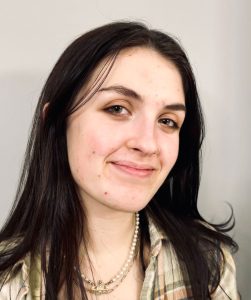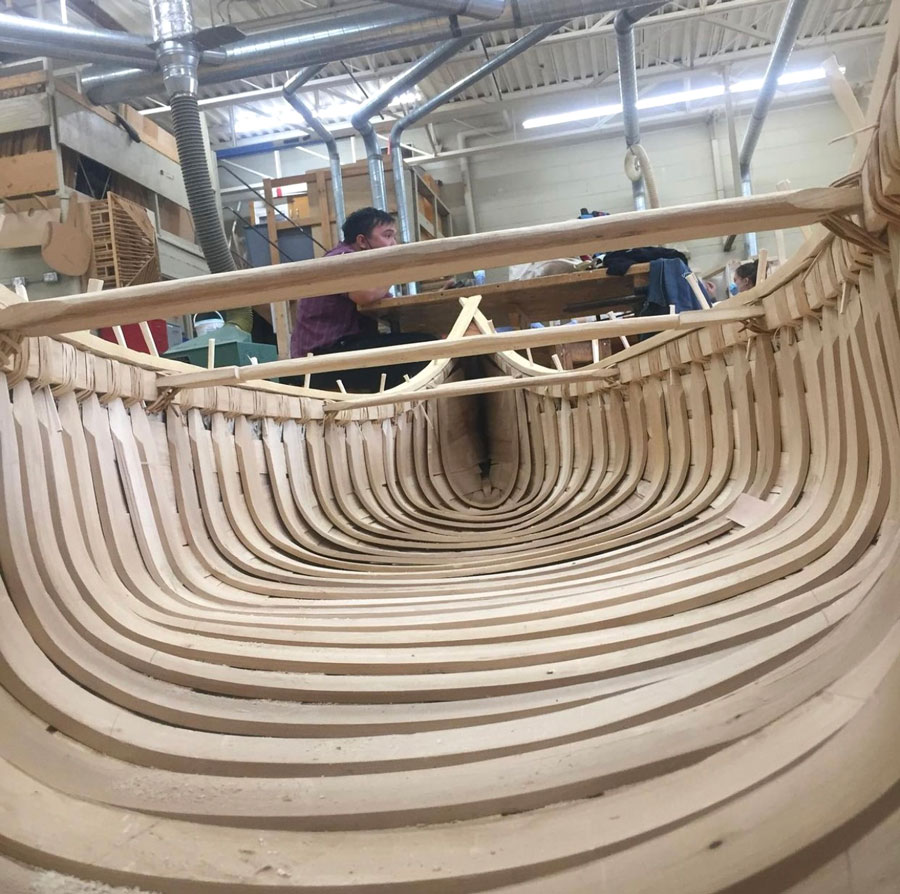CENTRE WELLINGTON – An experience building a canoe in traditional Indigenous ways has led a Centre Wellington District High School student to appreciate her Indigenous heritage and take on social justice projects at the school.
Grade 10 student Avaline Booth took part in a special program offered to five Indigenous students at the Upper Grand District School Board last summer.
Booth is a citizen of the Métis Nation of Ontario whose ancestors were fur traders with the Northwest Fur Company.
The course was worth half a credit and the five students worked with Indigenous canoe-builder Chuck Commanda to build a canoe by hand using materials gathered from nature. Three students went to schools in Guelph, one in Orangeville, and Booth in Centre Wellington.
Commanda collected most of the materials in Algonquin Park and brought them to John F. Ross high school in Guelph, and over nine days he and his pupils built a canoe.
Booth shared her story with the Rotary Club of Centre Wellington on Feb. 3.
“We learned to work with gifts from the land and cultural teachings,” she told club members in the Zoom presentation.
“I can’t believe I earned a half-credit for this. It didn’t feel like I was at school at all.”
Booth explained the building process – of carving nails, soaking the wood and steaming it to make it bendable, and lashing the cedar to the frame.
Students were sent outside to find spruce gum, melted and strained it through a burlap sack, and used the clear end-product to fill holes and gaps in the canoe.
Commanda is a master birch bark canoe builder from the community of Kitigan Zibi, in Quebec. He’s been building canoes for 40 years, working with school boards for 10, and he told the students that working with students “is the best way to pass on knowledge,” Booth said.
“The best part for me was the launch,” she continued. “It sat pretty low on the water, but that canoe could carry two men and a 1,200-pound moose.”
Booth said important lessons she learned are to be patient and not try to force processes that aren’t working.
“Not everything worked,” she said. “Chuck told us that if it doesn’t want to go, it doesn’t’ go.”

Avaline Booth
The canoe spent a week on display at each of the students’ home schools and while the canoe was at Centre Wellington Booth invited teachers to bring their classes down while she gave a 15-minute presentation.
“Some classes weren’t that interested, but the wood shop was so intrigued. They wanted to know all about the construction and were really interested in how it turned out. Chuck would be proud,” she said.
Booth said going into the project she knew she was going to build a canoe but didn’t appreciate the other benefits until after the fact.
“It was my first experience with hands-on learning, de-colonized learning,” she said.
“Working with my hands I felt, this is who I am. It felt really important.”
She said in history class, Indigenous learning has been focussed on residential schools and the recent discovery of unmarked graves at some former residential school sites across the country.
“It’s really important to know this, but all we hear of Indigenous history is negative. It felt good to connect to my culture in such a positive way,” she said.
Booth said this fall she started an Indigenous Student Alliance at the school and the club hopes to hold meaningful events this year.
“I want people to see the positive aspects of Indigenous culture and this was very positive,” she said.
“The Indigenous population is very small at my school. I’m hopeful [the club] will be a place where Indigenous students can come and see that they are supported.”
Colinda Clyne is the curriculum lead for First Nation, Metis, and Inuit Education at the Upper Grand and was the impetus behind the canoe project.
“That’s exactly what we hoped – that it would have a lasting impact on the students involved,” she said.
Clyne noted it’s been difficult to advance her work with Indigenous students as schools have barely been open during the pandemic.
But the board is working on courses and ways to teach courses to capture Indigenous culture and not always reinforce colonial forms of education.
“So how do we do that at the board and how do we create that in the program? That’s the question.”
Clyne said she’s pleased these students, who didn’t know each other before the course, have now become friends.
“They are all connected now. That might be the most important part of the work,” she said.




